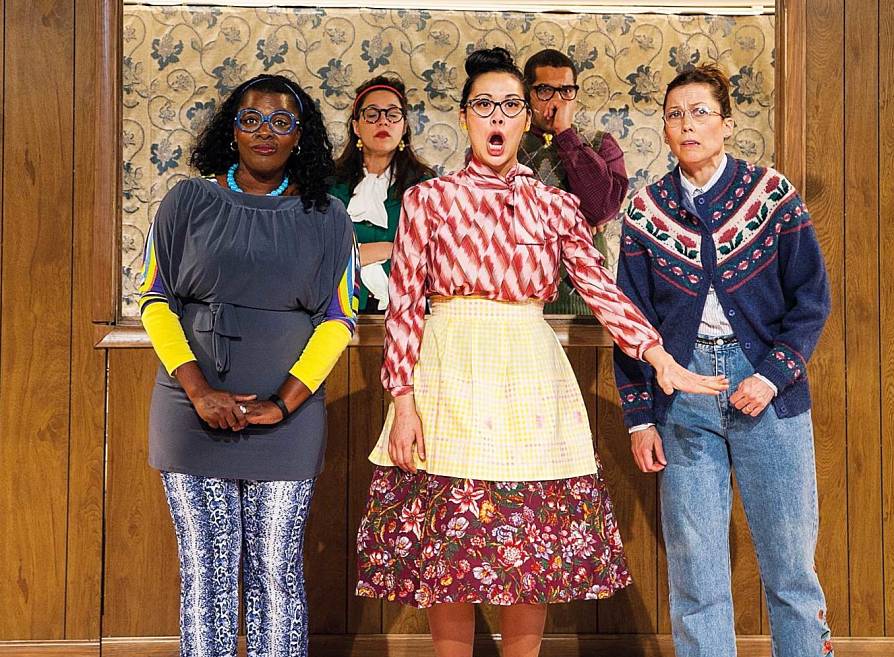Challenge
To get parents, busy people and the creative class to your shows.
Plan
Create one end-of-run Friday matinee.
What Worked
Full houses, diverse audiences, and the feeling that the show becomes an event.
What Didn’t
Special attention should be paid to marketing; doubleheaders are tiring for actors.
What’s Next
Happy hour, anyone?
Nearly two-and-a-half years ago, in January 2013, Susan Bernfield, producing artistic director of New York City’s New Georges theatre, found herself festival-hopping. “I remember seeing a matinee performance of Julia Jarcho’s Grimly Handsome,” she recalls, “and it felt like the best party I’d been to in ages.” She describes spotting all kinds of industry types from agents and presenters to producers and artistic directors, as well as artists and regular audience members, at the daytime performance. “The house was packed, and I thought, ‘If this was a convenient time for me and for all these other people to see the show, maybe there’s something there to think about,’” says Bernfield.
Appreciation for matinees tends to come with age—at least it has for me. Matinees are common enough for children: You see theatre during school days or on weekend afternoons, and over time you graduate to “adult” theatre viewing times at night. But more and more I find myself drawn to an afternoon performance if the opportunity presents itself, because after a day of working or rehearsing, a cozy dark theatre becomes a dangerously easy place to doze! And while certain audience stereotypes may haunt the Broadway Wednesday matinee (tourists and older folk?), Off and Off-Off Broadway matinees—on other days of the week, no less—don’t carry the same associations.
Later in the spring of 2013, New Georges was producing Lynn Rosen’s Goldor $ Mythyka, codeveloped and directed by Shana Gold, and the team decided to try out a Friday afternoon performance. New Georges managing director Jaynie Saunders Tiller recalls, “We’ve always done shows on Mondays, which people appreciate. For folks who are in shows, it’s the only night they can come.” A Friday afternoon show seemed like a good addition, and the team determined its matinee would fall on a Friday near the end of the run so that there was a “last chance” sense of urgency to it. The marketing tactic worked—roughly 50 out of 70 seats had butts in them. Moreover, “Every one that came said, ‘Thank you for having the show at this time. I never would have been able to come otherwise,’” Bernfield remembers.
Since then, New Georges has continued its experiment with afternoon performances, including at its “Jam on Toast” festival, which last year featured a whopping 45 performances in two-and-a-half weeks. Tiller points out that having afternoon performances can draw larger press attendance earlier on in a run, since there are fewer shows competing to be seen in the afternoon. New York Times reporter Neil Genzlinger, for example, attended an afternoon preview of Kate Benson’s A Beautiful Day on the Banks of the Greatest of the Great Lakes during “Jam on Toast,” so that by the time the play officially opened his rave review had already come out. #Notbad.
Tiller also points out that these days, people’s schedules tend to be more flexible. “Maybe you’re up at 6 a.m. working, so your free time now happens in different pockets. Having a Friday matinee is in some ways a reaction to the computers in our hands and always being ‘available.’” Tiller and Bernfield are quick to point out that the Friday matinee doesn’t discriminate and attracts everyone from donors and board members, to lawyers leaving the firm a bit early, to people visiting from out of town and trying to cram as much as possible into a short visit. The matinee is also great for a particularly elusive age bracket: the 35- to 50-year-old set, otherwise known as parents.
Bernfield, who is a mother of two, points out that she doesn’t go to shows on the weekends because it otherwise eats into precious family time. “Part of starting the Friday matinee thing has been in hopes that others will follow. I’m so tired of telling people, ‘Sorry I can’t see your show.’”
For Benson’s Great Lakes, which New Georges remounted in January in a coproduction with Women’s Project Theater, New Georges had to fill a larger-than-usual house of 100 seats. They still did a Friday matinee despite some of the peculiar challenges that effort can present, such as dealing with actor fatigue for a doubleheader. Still, if it’s only one matinee per run (New Georges promotes it with #oneperrun), scheduling doesn’t usually present a big issue, especially when planned in advance, and a certain momentum carries performers on to the late-night show.
Special attention needs to be given to marketing as well. “It requires calling out the opportunity,” says Bernfield, who sent out a special e-mail blast about the performance the week the Great Lakes matinee was happening. “It was a marketing technique, but also abject fear,” Bernfield jokes, acknowledging that ticket sales for matinees rely on a fair amount of walk-ups. Bernfield estimates about 60 tickets were pre-sold for the Friday matinee. (All told, there were 94 people at the performance, including this writer, who decided on the spur of the moment to drop everything and head to the theatre.)
It would be silly to ignore the fact that part of the Friday matinee’s appeal is the chance for indulgence it provides for audience members. Who doesn’t love dipping out of work early? And if you work in the theatre industry, you’re technically doing something work-related. “The leaving work early thing is a framing device,” says Bernfield, “but I’m hoping the Friday performance at 3 p.m. sparks a conversation about what a matinee even is, and how we can use it to build audiences. The show becomes a chance for a hangout and a conversation.”
Tiller concurs, adding, “Next time we do this we’ll be tying the performance to a happy-hour event, for sure.”


